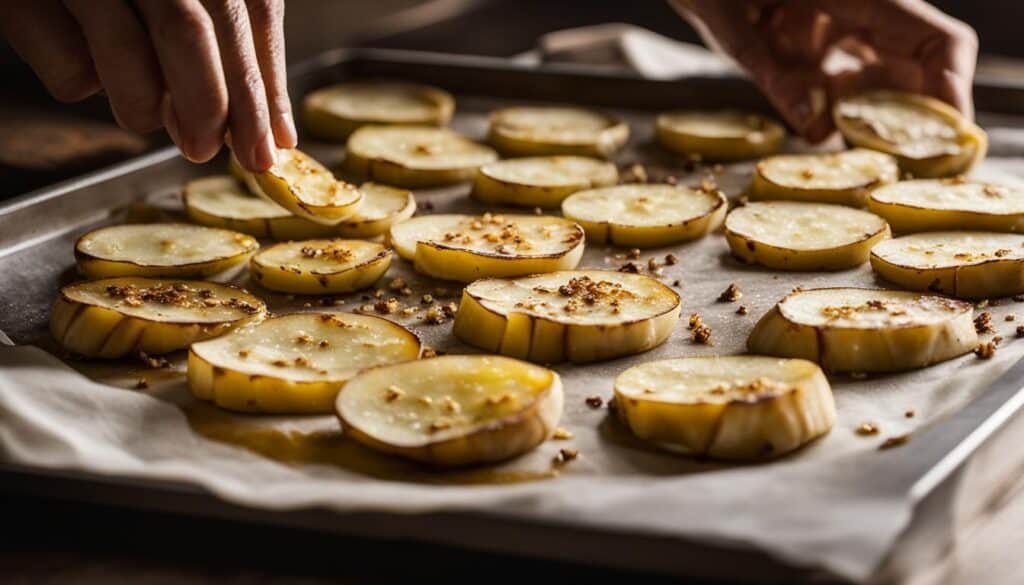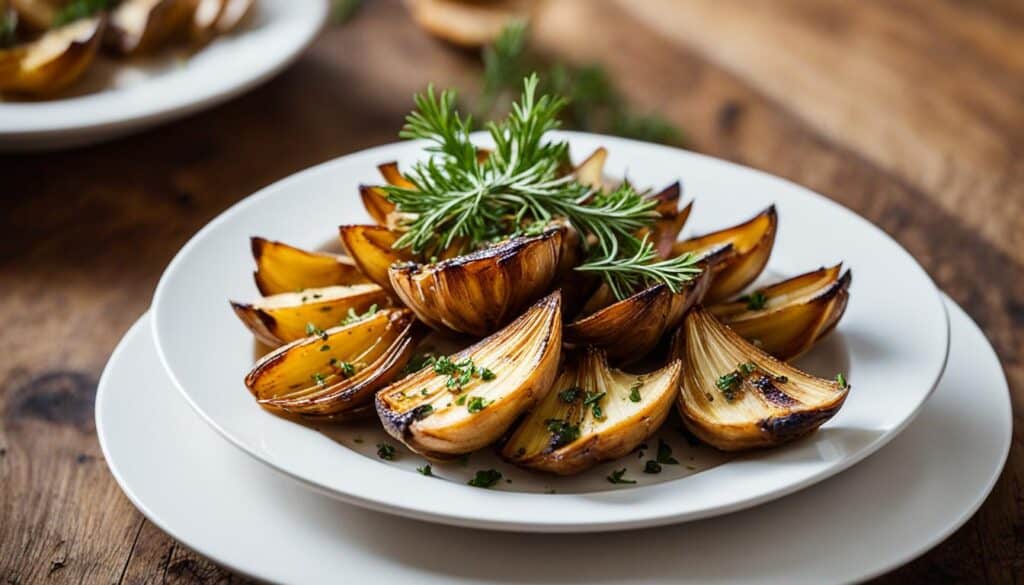Get ready to discover the incredible health benefits of Jerusalem artichokes, also known as sunchokes. These humble tubers are packed with goodness, making them a nutritious addition to your diet. From promoting gut health to being a low-carb vegetable suitable for keto diets, the versatility of Jerusalem artichokes will leave you amazed.
Key Takeaways:
- Jerusalem artichokes, also known as sunchokes, offer numerous health benefits.
- They contain inulin, a prebiotic fiber that promotes a healthy gut.
- Jerusalem artichokes are a good source of protein, iron, and potassium.
- They can help reduce blood pressure and are suitable for keto diets.
- Incorporate Jerusalem artichokes into your meals with easy and delicious recipes.
What are Jerusalem artichokes?
Jerusalem artichokes, also known as sunchokes, are root vegetables that grow underground. Despite their name, they are not related to artichokes and have a distinct flavor. They have a slightly nutty and mildly sweet taste and can be used as a substitute for potatoes or other root vegetables in various recipes. Jerusalem artichokes are nutrient-dense, rich in vitamins and minerals such as vitamin C, iron, and potassium.
Jerusalem artichokes, also known as sunchokes, are flavorful and versatile root vegetables. While they may not resemble artichokes in appearance, they offer a unique taste that sets them apart from other root vegetables. Their slightly nutty and mildly sweet flavor makes them a delightful addition to any dish.
Unlike traditional tubers like potatoes, Jerusalem artichokes offer a nutrient-dense alternative that promotes a healthy diet. They are packed with essential vitamins and minerals, including vitamin C, iron, and potassium. Incorporating Jerusalem artichokes into your meals provides not only a delicious taste but also a boost of beneficial nutrients for your overall well-being.
Health benefits of Jerusalem artichokes
Jerusalem artichokes, also known as sunchokes, offer a myriad of health benefits. These nutrient-packed tubers are rich in inulin, a non-digestible dietary fiber known for its prebiotic properties. Let’s explore some of the ways Jerusalem artichokes can positively impact your health:
- Gut Health: Inulin acts as food for the beneficial bacteria in your gut, promoting a healthy gut microbiome. This fiber helps improve digestion, supports regular bowel movements, and enhances nutrient absorption. It also inhibits the growth of harmful bacteria, contributing to overall gut health.
- Blood Sugar Control: The fiber content in Jerusalem artichokes plays a crucial role in regulating blood sugar levels. The slow digestion and absorption of these complex carbohydrates prevent spikes in blood glucose, making them a suitable food choice for diabetics and individuals looking to manage their blood sugar levels.
- Heart Health: The high potassium content in Jerusalem artichokes supports heart health by regulating blood pressure and reducing the risk of cardiovascular diseases. Additionally, the fiber in these tubers can help lower cholesterol levels, further benefiting heart health.
- Weight Management: Jerusalem artichokes are low in calories and rich in fiber, making them a great addition to a weight loss or weight management diet. The fiber content keeps you feeling full and satisfied, reducing overeating and aiding in weight control.
- Enhanced Nutrient Intake: Jerusalem artichokes are a good source of quality protein, iron, and potassium. Protein is essential for building and repairing tissues, while iron is crucial for oxygen transport in the body. Potassium supports proper nerve and muscle function, maintaining electrolyte balance.
By incorporating Jerusalem artichokes into your diet, you can enjoy these health benefits and add variety to your meals. Whether roasted, pan-fried, boiled, or consumed raw, Jerusalem artichokes are a versatile and nutritious addition to any dish.
How to cook Jerusalem artichokes
Jerusalem artichokes, also known as sunchokes, can be cooked in various ways to bring out their unique flavors and textures. Whether you prefer the nutty flavor of roasted artichokes or the crunch of raw slices in a salad, there are plenty of options to explore in the kitchen.
Roasting Jerusalem Artichokes
To roast Jerusalem artichokes, start by preheating your oven to 400°F (200°C). Scrub the artichokes thoroughly, leaving the skin intact, as it adds flavor and texture to the dish. Cut them into even-sized pieces to ensure even cooking. Toss the artichokes with olive oil, salt, and pepper, and spread them evenly on a lined baking sheet.
Bake the artichokes for approximately 30-40 minutes, or until they are tender and golden brown. Remember to turn them once or twice during the cooking process to achieve an even texture. Serve the roasted Jerusalem artichokes as a delicious side dish or incorporate them into salads and grain bowls for added flavor.
Pan-Frying Jerusalem Artichokes
Pan-frying Jerusalem artichokes is another tasty cooking method that brings out their natural sweetness. To pan-fry, peel and slice the artichokes into thin rounds. In a skillet, heat oil or butter over medium heat. Add the artichoke slices and cook them until they are golden brown and crispy, flipping them occasionally to prevent burning.
You can enhance the flavor of pan-fried Jerusalem artichokes by adding herbs, spices, or garlic. Consider combining them with other vegetables, such as onions and bell peppers, for a delicious side dish. Pan-fried Jerusalem artichokes also make a wonderful topping for pizzas or a crunchy addition to salads.
Boiling Jerusalem Artichokes
Boiling Jerusalem artichokes is an ideal method for making soups, purees, or mashes. Start by peeling the artichokes and cutting them into small pieces for faster cooking. Place the artichokes in a pot of boiling water and cook them until tender, typically for 15-20 minutes. Drain the artichokes and mash them to your desired consistency. Season with salt, pepper, and other herbs or spices for added flavor.
Boiled Jerusalem artichokes can be added to soups, stews, or casseroles, lending their distinct taste and creamy texture. They can also be used as a base for creamy vegetable dips or spreads.
Raw Consumption
Unlike potatoes, Jerusalem artichokes can also be enjoyed raw. Their crisp and crunchy texture makes them a great addition to salads or slaws. To consume them raw, slice or grate the artichokes and toss them with other fresh vegetables and dressings to create a refreshing and nutritious dish.
Remember to thoroughly wash the artichokes before consuming them raw to remove any dirt or impurities. Raw Jerusalem artichokes add a unique texture and flavor to salads, providing a delightful crunch and a hint of nuttiness.
Easy roasted Jerusalem artichoke recipe
If you’re looking for a simple and delicious way to enjoy Jerusalem artichokes, look no further than this easy roasted recipe. Roasting brings out the natural nutty flavor of the artichokes and creates a slightly crispy texture that makes them perfect as a side dish. Whether you’re following a keto, vegan, or paleo diet, these roasted Jerusalem artichokes are a nutrient-dense and prebiotic addition to your meals.
To make this recipe, you’ll need:
- 1-2 pounds of Jerusalem artichokes
- Olive oil or coconut oil
- Herbs of your choice
- Optional chili flakes for some added heat
Here’s how to prepare the roasted Jerusalem artichokes:
- Start by washing the Jerusalem artichokes thoroughly.
- Chop the artichokes into bite-sized pieces.
- Toss the artichoke pieces in a bowl with olive oil or coconut oil, ensuring they are coated evenly.
- Add your choice of herbs to the bowl and mix well. Popular options include rosemary, thyme, or garlic powder.
- If you like a bit of spice, sprinkle some chili flakes over the artichokes and mix.
- Spread the coated artichokes on a lined baking sheet.
- Bake them in a preheated oven at 375°F for 10-12 minutes, turning them halfway through to ensure even roasting.
Once the roasted Jerusalem artichokes are golden brown and tender, they are ready to be served as a delicious and healthy side dish. The combination of flavors from the roasted artichokes and the herbs will create a mouthwatering experience for your taste buds. You can also use them as a topping for salads or garnish for soups for added texture and flavor.
So why not give this easy roasted Jerusalem artichoke recipe a try? It’s a versatile dish that will impress your family and guests while providing a nutritious addition to your meal.
Jerusalem artichoke recipes to try
Looking for delicious ways to incorporate Jerusalem artichokes into your meals? Look no further! Check out these popular recipes featuring this versatile tuber:
Roasted Jerusalem Artichokes
Roasting Jerusalem artichokes is a simple yet flavorful way to enjoy their nutty taste. Seasoned with spices and herbs, they are baked until golden brown and tender. The crispy exterior and creamy interior make them a delightful side dish or even a tasty snack.
Jerusalem Artichoke Soup
Indulge in the creamy and nutty flavors of Jerusalem artichoke soup. This comforting dish combines roasted Jerusalem artichokes, vegetable broth, and aromatic herbs and spices. It’s a perfect choice for a chilly evening or as a starter for a special meal.
Pan-Fried Jerusalem Artichokes with Bacon
For a savory twist, try pan-frying Jerusalem artichokes with crispy bacon. This combination creates a mouthwatering blend of flavors and textures. Simply sauté sliced Jerusalem artichokes and bacon in a skillet until golden and crispy. Serve it as a side dish or as a delicious addition to salads or roasted meats.
Pickled Jerusalem Artichokes
Add some zing to your meals with pickled Jerusalem artichokes. This tangy and refreshing option is perfect for those who enjoy a bit of acidity in their dishes. The pickling process takes a bit of time but is well worth the effort. Enjoy the pickled Jerusalem artichokes as a side dish, in sandwiches, or as a unique garnish.
These recipes showcase the incredible versatility of Jerusalem artichokes and will surely impress your family and friends. Whether you prefer the crispy goodness of roasted artichokes, the creamy richness of a soup, or the savory note of pan-fried ones, there’s a recipe here to satisfy every palate.
| Recipe | Description |
|---|---|
| Roasted Jerusalem Artichokes | Seasoned and baked until golden brown and tender, these roasted artichokes are a flavorful side dish or snack. |
| Jerusalem Artichoke Soup | A creamy and nutty soup made with roasted Jerusalem artichokes, vegetable broth, and aromatic herbs and spices. |
| Pan-Fried Jerusalem Artichokes with Bacon | Sliced Jerusalem artichokes and crispy bacon pan-fried to perfection, creating a delicious side dish or addition to salads and roasted meats. |
| Pickled Jerusalem Artichokes | Tangy and refreshing pickled Jerusalem artichokes, perfect as a side dish, in sandwiches, or as a unique garnish. |
Where to buy Jerusalem artichokes
If you’re looking to add Jerusalem artichokes to your culinary repertoire, you might be wondering where to find them. While they may not be widely available in most grocery stores, there are a few places you can check to get your hands on these delicious tubers.
Specialty Produce Stores
One of the best places to find Jerusalem artichokes is in specialty produce stores. These stores often carry a wide variety of unique fruits and vegetables that may not be readily available elsewhere. They cater to individuals who are passionate about cooking and are looking for high-quality, specialty ingredients. Check out your local specialty produce store, and you just might find a fresh batch of Jerusalem artichokes waiting for you.
Health Food Stores
Health food stores, such as Whole Foods, are also known for their extensive selection of fresh produce. If you’re searching for Jerusalem artichokes, consider visiting your nearest health food store. These stores prioritize organic and locally sourced products, offering a range of specialty ingredients for health-conscious individuals. Make sure to explore the produce section, as that’s where you’re most likely to find Jerusalem artichokes.
Farmer’s Markets
For those who prefer to support local farmers and get the freshest ingredients, farmer’s markets are an excellent option. Many farmers grow Jerusalem artichokes and bring them directly to the market, ensuring that you’re getting the highest quality produce available. Along with the Jerusalem artichokes, you’ll also have the opportunity to discover other seasonal and locally grown fruits and vegetables.
Visiting farmer’s markets not only allows you to buy fresh Jerusalem artichokes, but it also offers a unique shopping experience. You can interact with the farmers, ask questions about their growing practices, and learn more about the produce they offer.
If you’re unable to find fresh Jerusalem artichokes, don’t worry! They may be available in other forms, such as frozen or pickled. Explore different stores and inquire about their selection to find the option that suits your needs.
Now that you know where to buy Jerusalem artichokes, you can embark on your culinary journey with this versatile vegetable, reaping its health benefits and discovering delicious recipes to enjoy.
Conclusion
Jerusalem artichokes, also known as sunchokes, are a versatile vegetable that offers a wide range of health benefits. These tubers are packed with inulin, a prebiotic fiber that supports gut health and aids digestion. Additionally, Jerusalem artichokes are a rich source of essential nutrients such as protein, iron, and potassium, making them an excellent addition to a balanced diet.
Incorporating Jerusalem artichokes into your meals is both simple and enjoyable. There are numerous easy recipes available, allowing you to explore the versatility of this vegetable. From roasted Jerusalem artichokes, which bring out their nutty flavors and add a satisfying crunch, to comforting soups and flavorful side dishes, there are endless possibilities to tantalize your taste buds.
Whether you’re seeking to improve your gut health or broaden your culinary horizons, Jerusalem artichokes are a nutritious and delicious choice. So why not unleash your creativity in the kitchen and indulge in the health benefits of this versatile vegetable?









Leave a Reply